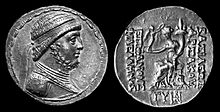Mithridates II of Parthia
- Mithridates II of Parthia
-

Mithridates II the Great.

Early coin of Mithridates II the Great of Parthia from Seleucia on the Tigris.
The reverse shows a seated goddess (
perhaps Demeter)
holding Nike and a cornucopia.
The Greek inscription says Coin of the Great king Arsaces, friend of the Greeks
Mithridates II the Great was king of Parthian Empire from 123 to 88 BC. His name invokes the protection of Mithra. He adopted the title Epiphanes, "god manifest" and introduced new designs on his extensive coinage. Parthia reached its greatest extent during his reign. He saved the kingdom from the Saka tribes, who occupied Bactria and the east of Iran and killed two of his predecessors in battle. Mithridates II extended the limits of the empire, according to the 3rd century Roman historian Junianus Justinus who tends to confuse him with Mithridates III, under whom Parthia received severe setbacks. He defeated King Artavasdes I of Armenia and conquered seventy valleys, making the heir to the Armenian throne, prince Tigranes, a political hostage. In 123 BC and 115 BC he received Chinese ambassadors sent by the Han emperor Wu Di to reopen the Silk Road through negotiations. His later coins show him bearded, wearing the high domed Parthian crown applied with a star. He also interfered in the wars of the dynasts of Syria. He was the first Parthian king who entered into negotiations with Rome, then represented by Lucius Cornelius Sulla, praetor of Cilicia in 92 BC.
References
 This article incorporates text from a publication now in the public domain: Chisholm, Hugh, ed (1911). Encyclopædia Britannica (11th ed.). Cambridge University Press.
This article incorporates text from a publication now in the public domain: Chisholm, Hugh, ed (1911). Encyclopædia Britannica (11th ed.). Cambridge University Press. - Junianus Justinus, xlii, 2.
- Strabo, xi, 532.
- Josephus, Antiquities of the Jews xiii, xiv.
Categories: - History of Iran
- 88 BC deaths
- Parthian kings
- 2nd-century BC Asian rulers
- 1st-century BC Asian rulers
Wikimedia Foundation.
2010.
Look at other dictionaries:
Mithridates I of Parthia — For other people named Mithridates, see Mithridates (disambiguation). Coin of Mithridates I from the mint at Seleucia on the Tigris. The reverse shows Heracles holding a cup, lion s skin and club. The Ancient Greek inscription reads ΒΑΣΙΛΕΩΣ… … Wikipedia
Mithridates IV of Parthia — Coin of Mithridates IV. Reverse shows a seated archer holding a bow, surrounded by mostly meaningless Greek like letterforms – though ΔΙΚΑΙΟΥ, [of] the just , remains readable – and a line of Aramaic at top. Mithridates IV of Parthia ruled the… … Wikipedia
Mithridates III of Parthia — Coin of Mithridates III from the mint at Nisa. The reverse shows a seated archer holding a bow. The Greek inscription reads ΒΑΣΙΛΕΩΣ ΒΑΣΙΛΕΩΝ ΑΡΣΑΚΟΥ ΜΕΓΑΛΟΥ ΘΕΟΥ ΕΥΠΑΤΩΡ[ΟΣ] ΚΑΙ ΦΙΛΕΛΛΗΝΟΣ (king of kings, great Arsaces, good father god, and… … Wikipedia
Mithridates — or Mithradates is the Hellenistic form of an Iranian theophoric name, meaning given by the deity Mithra . It may refer to: Rulers Mithridates I of Parthia (r. 171 138 BC) Mithridates II of Parthia (r. 110 87 BC) Mithridates III of Parthia (r. 58… … Wikipedia
Parthĭa — (Parthyēne), Landstrich in Asien; begrenzt von Hyrkanien, Arien, Karmanien u. Medien; umfaßte den südwestlichen Theil des j. Khorasan, Kohestan u. einen Theil der großen Salzwüste; die Gebirge an den Grenzen waren: in Osten Masdoranos, in Norden… … Pierer's Universal-Lexikon
Mithridates of Armenia — Mithridates (Georgian: მითრიდატე) of Armenia (flourished 1st century) was an Iberian prince and a king of Armenia under the protection of the Roman Empire. Mithridates was installed by his brother Pharasmanes I of Iberia who, encouraged by… … Wikipedia
Parthia — Infobox Former Country native name = Ashkâniân (اشکانیان) conventional long name = Parthian Empire common name = Parthia| continent = moved from Category:Asia to the Middle East region = Middle East, Central Asia, and Western Asia country = Iran… … Wikipedia
Parthia — Die Parther (altpersisch Parθava, lat. Parthi) waren ein antikes iranisches Volk, das vom 3. Jahrhundert v. Chr. an im heutigen Iran ein Reich aufbaute, welches schließlich auch große Teile Mesopotamiens, des südwestlichen Mittelasiens und… … Deutsch Wikipedia
Mithridates II. (Parthien) — Münze von Mithridates II. Mithridates II. (persisch مهرداد Mehrdād [meɦrˈdɔːd]; von Mithras gegeben) war ein parthischer König, der von ca. 123 bis 88 v. Chr. regierte. Er wurde schon in der Antike de … Deutsch Wikipedia
Mithridates I — (reigned 171 ca. 138 b.c.) A Parthian king who made the Parthian Empire an independent and major Near Eastern power. Mithridates brother Phraates (reigned 176 171 b.c.), who had ruled the Parthians before him, had paid tribute to the Greek… … Ancient Mesopotamia dictioary
 This article incorporates text from a publication now in the public domain: Chisholm, Hugh, ed (1911). Encyclopædia Britannica (11th ed.). Cambridge University Press.
This article incorporates text from a publication now in the public domain: Chisholm, Hugh, ed (1911). Encyclopædia Britannica (11th ed.). Cambridge University Press.

